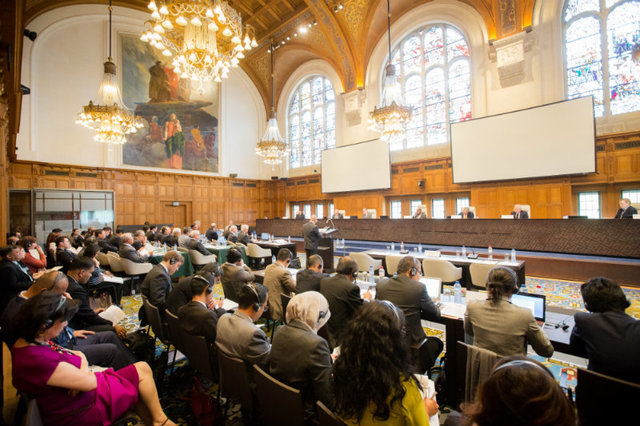From Rappler (Nov 28):
PH vs China: Why a win for Manila benefits the region
Maritime law expert Jay Batongbacal says a ruling striking down China's 9-dash line will be a victory not just for the Philippines but also for other claimant countries
 GLOBAL INTEREST. Seven countries send observers to the arbitral tribunal hearings at The Hague on the Philippines' historic case against China. File photo from the Permanent Court of Arbitration
GLOBAL INTEREST. Seven countries send observers to the arbitral tribunal hearings at The Hague on the Philippines' historic case against China. File photo from the Permanent Court of Arbitration
What do Australia, Indonesia, Japan, Malaysia, Singapore, Thailand, and Vietnam have at stake in the Philippines' historic arbitration case against China over the South China Sea?
A leading maritime law expert explained that more countries sent observers to the second round of hearings at The Hague because the tribunal's ruling will have implications beyond the Philippines, especially on other claimant countries.
Jay Batongbacal, director of the University of the Philippines Institute for Maritime Affairs and Law of the Sea, said a ruling striking down China's 9-dash line will affect how other claimants deal with Beijing.
“If that claim is granted, we can say that the Philippines will have achieved victory even if the remaining claims are not. Why? Because the 9-dash line is ultimately the source of all these problems. If the tribunal declares it to be illegitimate, then China's negotiating position and arguments in dealing not only with us, but with its neighbors will be seriously undermined,” Batongbacal told Rappler.
A 48-member
Philippine delegation is at The Hague to argue the merits of Manila's claims after the tribunal ruled in October that it has the power to decide the case. The hearings last from November 24 to 30, with a final ruling expected in mid-2016.
Batongbacal said that a ruling declaring the 9-dash line invalid under the UN Convention on the Law of the Sea (UNCLOS) will strengthen the negotiating position of the Philippines and other claimant countries.
He cited Vietnam, which figured in a standoff with China last year after
Beijing sent an oil rig about 120 nautical miles off its coast, in what Hanoi considers its exclusive economic zone. It led to the worst breakdown in Sino-Vietnamese ties since a brief border war in 1979.
“It's on the same basis, the 9-dash line. In those respects, the situation of the parties are similar. Vietnam would be able to use the findings of the tribunal as well in its dealings with China. In that way, Vietnam's hand will be stronger as well,” Batongbacal said.
China uses the 9-dash line to claim practically the entire South China Sea. The Philippines calls the parts it claims as the West Philippine Sea.
Vietnam, Malaysia, Brunei, and Taiwan also have claims to the strategic waterway, believed to sit atop vast deposits of oil and gas.
“Indonesia actually is interesting because it is not a claimant but it has been experiencing very similar activities, acts of assertion from China with respect to fishing in waters close to the Natuna islands. If that happens again, Indonesia can actually bring China to court,” Batongbacal said.
The professor said the same thing goes for Malaysia, which has been experiencing interference from China in its oil and gas activities off Borneo.
As for new observers Australia and Singapore, their interests lie in freedom of navigation in a sea where $5 trillion in shipping trade passes through each year.
“All the ships that go to Australia between the Asian mainland, particularly China, have to pass through the South China Sea. On the other hand, Singapore, being a port state, it's entirely dependent on shipping and that passes through the sea. They do have an important interest in keeping the sea stable, safe for commercial shipping,” Batongbacal said.
LOSS UNLIKELY. Maritime law expert Jay Batongbacal says it's unlikely the Philippines will lose all its claims in its arbitration case against China over the South China Sea. Photo by Ayee Macaraig/Rappler
'Environment claims have chance of winning'
Batongbacal laid out different scenarios for the final ruling called the arbitral award.
He said the Philippines can lose all 15 of its claims but the scenario is unlikely as some arguments have “a very good chance” of being granted.
These include the claim that China's fishing and reclamation activities violated UNCLOS provisions to protect the marine environment. Another is the claim that Chinese law enforcement vessels' activities against Philippine ships endanger safety and life at sea.
“Those obligations exist regardless of where you are at sea: whether you're at territorial sea, the high seas, those safety obligations apply. Those kinds of claims stand a very good chance of being granted,” he said.
The second scenario is to have a mixed ruling, where some claims are granted while others are not.
The third possibility is for the Philippines to win all its claims, with the tribunal invalidating the 9-dash line and Chinese activities.
“Certain activities will clearly be defined to be illegal and illegitimate, therefore, China has to stop them.”
'South China Sea the ultimate loser'
World leaders including US President
Barack Obama and German Chancellor
Angela Merkel voiced support for arbitration as a means of peacefully settling the dispute. Manila is banking on international opinion to pressure Beijing to comply with a ruling unfavorable to China.
Yet Batongbacal said these statements of support will have no immediate impact on China.
“China has never bowed to international pressure. All you need to do is look at Tibet. Look at all the human rights issues being raised against China, the dissidents. What international pressure does however introduce is it's like sowing winds of change in China. That decision-makers and policymakers become aware that they need to be more careful in their policies and activities towards the region,” he said.
“That will cause them to take different tracks on their strategies, on their dealings, how they deal with these other countries, and that is where the change will come.”
With China vowing to defy a ruling, Batongbacal said the Philippines will likely turn to its treaty ally, the United States, and other members of the international community to balance Beijing's military weight.
Washington began sending
warships and planes near China's artificial islands in October to challenge Beijing's claim that these features generate maritime rights.
In the long-term, Batongbacal foresees increased military presence in the region as the US continues its freedom of navigation patrols, and as the claimant countries try to engage in their own resource exploration and exploitation activities.
“Ultimately, the loser will actually be the South China Sea – not even the countries but the sea itself. We're going to see those resources subject to the so-called tragedy of the commons because every other country will be racing to try to exploit its resources before the other one does.”






